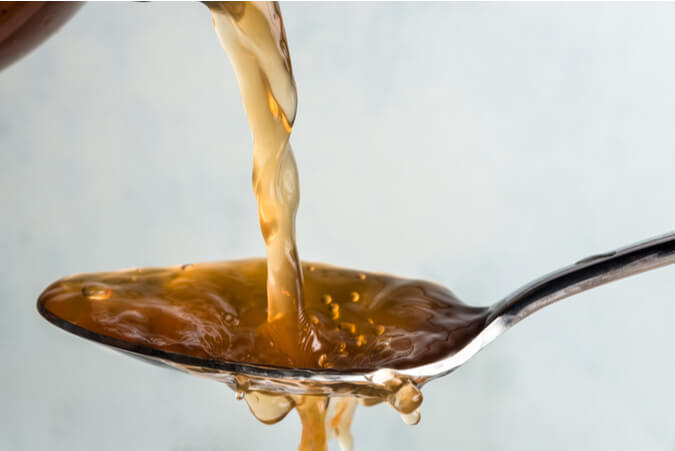Special thanks to Rosemary Gladstar for the following update on the court case involving the “fire cider” trademark. The court’s decision will be announced any day now, and we’ll keep you posted. We also have a special interactive interview with Rosemary in the works, and I’ll let you know as soon as we have all the details worked out with that so you can mark your calendar! —Marjory Wildcraft
So many people have asked us about court and what the outcome was for fire cider. I thought I’d try to tell the story and give a little update. I’m also so excited to announcing the upcoming publication of “Fire Cider! 101 Zesty Recipes for Health-Boosting Remedies Made With Apple Cider Vinegar,” a book written by many members of the herbal community in our attempt to keep the story alive for the sake of all of our traditional herbal recipes. Please pass this information along.
Fire Cider Goes to Court
The federal courthouse in Springfield, MA, is a large, modern building with an entire edifice of glass facing the street. With its “cascading concave roof gracefully framing the space in a delicate shell of steel and glass,” the courthouse is an imposing sight indeed. But even more impressive than this wall of steel and glass are the two ancient trees that the courthouse was obviously built around.
The glass walls literally curve around the largest Tilia europaea, or linden, tree I’ve ever seen and a huge old copper beech that looks like it’s been standing there for centuries. It’s obvious the architects took these trees into account when planning and building this courthouse. I later learned that their “presence was too powerful to ignore” … and the preservation of these trees “was a key element in the design proposal that emerged” for the courthouse.
Those two ancient guardian trees and the wild garden beneath them replete with healthy stands of black cohosh and maidenhair fern, helped make our days in federal court bearable. Their beauty and strength rooted us deeply—and gave us hope and courage.

So did the community members who came to support us during the 7 days of trial; the herbalists who brought us lunches that were spread picnic-style in the courthouse pavilion so that we’d have healthy food during the intensity of the trial; our witnesses, who traveled across the country to share their truth and tell their story all on their own dime and time; and our amazing lawyers, who worked primarily pro bono for the past 4 years, and poured not only their expertise but also their hearts into this case.
But most of all, those trees were a bastion of strength for 3 young women who were on trial, like in the witch hunts of old, for having the audacity to stand up for their herbal traditions: Nicole Telkes, Kathi Langelier, and Mary Blue. They came to be known as the Fire Cider Three. Ballads will be written about them. In fact, there are a few already being sung (and some are included in the new fire cider book!).
Four years of preparing for this trial and 7 exhausting days in Federal Court … all for a simple apple cider vinegar recipe aptly named fire cider. It’s a great recipe: it’s true, easy to make, tasty, versatile, an excellent cold and cough remedy, and a tasty condiment. But, really, who would have thought a simple ACV recipe made from common kitchen ingredients would become as popular as it has—or as wildly controversial. It certainly never crossed my mind that day a little over 4 decades ago when I made that first auspicious batch of fire cider as part of a winter health class.
Like most herbal recipes, it wasn’t fully original, but was based on several other old herbal recipes. I added my own touches, a few new herbs, a little something hot, a little honey for sweetness. When my students and I strained and tasted that first batch of herbal-infused vinegar several weeks later, a perfect merging of sweet, hot, spicy, sour, and pungent flavors exploded in our mouths. We knew we had created a winner and promptly named it “fire cider.”

And that’s how fire cider began … in the herb school kitchen of the California School of Herbal Studies somewhere between 1979 and 1980. It became one of many favorite recipes that I shared openly and freely with students and other herbalists. It spread out into the world rather slowly at first, but as I traveled and taught through the ensuing years, others learned how to make it, and they taught others, and it developed a life of its own.
And that’s how the story should have continued … but, unfortunately, it didn’t.
A little over 5 years ago, a young start-up company saw a great opportunity and trademarked “fire cider.” In our naiveté, we thought trademark laws were in place to provide protection for people who had created their own original products and/or names from others who were trying to copy them. We didn’t realize that, in fact, a trademark could sometimes be obtained by whoever grabbed the name and claimed ownership first. It was a wake-up call.
How Did We End Up in Court?
So just how did fire cider and several members of the herbal community end up in that courthouse in Springfield?
As beautiful as those trees were and as worthy as they were of a visit, being in Springfield isn’t something any of us had planned on. But oddly enough, that company that decided they had the sole right and ownership of “fire cider” (regardless that the recipe and name had been around for decades), next decided to take legal action against the Fire Cider Three and filed a $100,000 lawsuit against them. Their claim was that these 3 herbalists were damaging their business and had violated trademark laws. Nicole, Mary, and Kathi—each well-known community herbalists and farmers, avid activists, and supporters of traditional herbalism—had decided that something needed to be done, and that it wasn’t okay that companies could come along and buy up the rights to popular herbal remedies that were already in existence and were considered “community owned.”
As spokeswomen for the movement that was forming around fire cider, they founded two organizations—Traditions Not Trademarks and Free Fire Cider—both online resources dedicated to educating people about the issues surrounding the trademarking of traditional herbal products. The goal was to educate people as to why it’s important to keep these herbal treasures as legacy herbal products, available for everyone to make, use, and sell as they like. While the greater concern surrounded all traditional herbal products, the poster child was fire cider.
My role? As the creator of the original recipe and name, I was invested in getting this popular remedy back into circulation for the entire herbal community, and I worked closely with Nicole, Mary, and Kathi on behalf of fire cider. When the lawsuit was filed, I wasn’t included simply because I hadn’t sold fire cider since the sale of my herb shop in the 1980’s. But I was deeply invested and involved, and would take a stand for fire cider along with those 3 women no matter what happened.
It was never any of our intentions to go to court over this.
We had been hoping for a resolution through mediation, in which the company who had trademarked fire cider would continue to sell fire cider under their name, but still allow other smaller companies to sell it, as well. This would be similar to “Sriracha hot sauce” or “elderberry syrup,” where everyone would be a winner and enjoy a piece of the good old apple pie (another generic name sold and appreciated—not appropriated—by many companies and individuals). But that didn’t happen.
When the company filed a $100,000 lawsuit against Mary, Nicole, and Kathi, we were all shocked—and, quite honestly, frightened of the huge sum of money they were demanding. Thankfully, that huge sum was dismissed early on during the first trial. But the second trial over the trademark was still pending.… And that’s what brought us to State Street in the spring of 2019, where we discovered those huge guardian trees.
Court itself was interesting and intense. None of us had ever experienced anything quite like it, nor do we have plans to experience it again. We were all sworn in, examined and cross-examined, and asked for our testimonies. We told our truth and shared our stories. We were an awesome force, really.
Witnesses that got up to testify on behalf of fire cider spoke clearly and passionately, from the heart, of their work as herbalists and their history in making and selling fire cider. Several had sales receipts dating to the early 80’s, confirming they had been selling it long before the trademark had gone into effect.
Our expert key witnesses—Dr. Butters, a linguist, and Mark Blumenthal, founder of The American Botanical Council (ABC) and editor of the prestigious magazine “Herbal Gram”—presented convincing arguments for fire cider being a generic name, one that was free to be used by all.
Our lawyers, Seth Coburn and Jim Goggin of Verrill Dana LLP law firm, were simply amazing people. They really cared about the case and what it stood for. They understood what was at stake and were willing to devote endless hours with no pay to help preserve our traditional herbal recipes.
There were also those special moments between court sessions when we were together with members of the community who came to support us—and Traditions Not Trademarks—during the trial. They brought food, cheered us on, and helped disperse the anxiety that goes with being in court. And when we stood beneath those ancient guardian trees, grounding and receiving energy, they reminded us why we were even fighting this strange battle we found ourselves in and helped us draw strength from deep within the earth.
The Story Is Still Unfolding
Unlike in the movies, where the judge steps out after a few tense moments and publicly announces the final verdict, federal court has a long, meandering process. First, there are the court proceedings, which can take place over several months, followed a few weeks later by a debriefing between lawyers and the judge. Several weeks after that, the lawyers present their closing arguments to the judge, and then the judge has several weeks to think about it all and make his decision.
We’re all on the edge of our seats waiting (we’ll announce the verdict as soon as we hear back from the judge). If the case was to be determined simply on truth, the truth of who first made fire cider, the truth of who was selling it first, the truth of where it originated, and the truth that it’s been a popular herbal remedy for over 4 decades and is regarded as a traditional herbal legacy recipe, then the herbal community would certainly win.
But trademark laws are a slippery slope, and even the savviest trademark lawyer is never sure how a case will turn out. But no matter what the outcome, we’ve won simply by standing up for what we believed in, speaking our truth, and standing strong for our herbal traditions.
After all, they are some of the oldest traditions on the planet, and belong to all of us.…
Please Protect Your Traditions
Many of the recipes, formulas, and names of herbal formulas that have been shared and passed down through generations are part of a shared herbal inheritance and legacy. While trademark laws are necessary to protect individuals and companies for their investments and products, herbal recipes and formulas that are traditional and commonly used and shared should not be trademarked. It would be like strangers trademarking your favorite family recipe and calling it their own. It happens, but it shouldn’t.
And Now, for the Good News!
After a flurry of lawsuits, Judge Mark G. Mastroianni’s decision last month determined that “fire cider” cannot be trademarked!
Announcing the upcoming publication of
“Fire Cider! 101 Zesty Recipes for Health-Boosting Remedies Made With Apple Cider Vinegar”
by Rosemary Gladstar & Friends
(Storey Publications, 2019)
Like most of this battle, this book—“Fire Cider! 101 Zesty Recipes for Health-Boosting Remedies Made With Apple Cider Vinegar”—has been a community effort and is our attempt to keep the story of fire cider alive and well. Even more importantly, it was written to help ensure that traditional herbal formulas—those recipes and remedies that have a long history of being used—are kept “free for all” to make, use, and sell as they choose.
It’s a lively collection of recipes contributed by more than 70 herbal enthusiasts, with energizing versions ranging from Black Currant Fire Cider to Triple Goddess Vinegar, Fire Cider Dark Moonshine, and Bloody Mary’s Fire Cider. Colorful asides, including tribute songs and amusing anecdotes, capture the herbal community’s passionate desire to pass along the fire cider tradition. Part of the proceeds from the sale of this book will go toward Traditions Not Trademarks, in an ongoing attempt to protect our traditional herbal remedies from trademarking.
__________________
The Grow Network is a participant in the Amazon Services LLC Associates Program, an affiliate program designed to provide a means for our team to earn fees for recommending our favorite products! We may earn a small commission, at no additional cost to you, should you purchase an item after clicking one of our links. Thanks for supporting TGN!

The Grow Network is a global network of people who produce their own food and medicine. We’re the coolest bunch of backyard researchers on Earth! We’re constantly sharing, discovering, and working together to test new paths for sustainable living—while reconnecting with the “old ways” that are slipping away in our modern world. We value soil, water, sunlight, simplicity, sustainability, usefulness, and freedom. We strive to produce, prepare, and preserve our own food and medicine, and we hope you do, too!








COMMENTS(6)
Hopefully in the future, with new legislation & new people in office traditions can be honored and carried on by herbalists as well as other farming/gardening folks. We need to be able to grow our own medicine! I applaud the courage & tenacity of these women who stood up to the lawsuits. It reminds me of a Chicago company that tried to trade mark the word “Aloha” for their business!
This is wonderful! Thank you so much for what ya’ll are doing. Many blessings.
How can any thing passed down thur the decades . All of them could not be the same . To me let have their ‘s. But we all know nothing is as good as mommy’s. Tell them that they have make every bottle the same – pick and write down dosage . But get the Ladies to get in writing Lawyer put it in law terms. Locking Big Pham in . Really after all these years & history Who’s going to trust them. Everyone should take all their’s meds to a pharmacist and you will have you mind blown to find the meds are overlapping and doing more damage than good. Then I got looking for natural meds and from the thing the Great Lord put on this plant not some man made high priced drug.
Thank you for the updates!
Keep posting updates please!
Thank you for the update and just know that we are all behind you in this fight. Tradition is important and my hope and prayer is that the judge recognizes its importance.